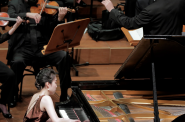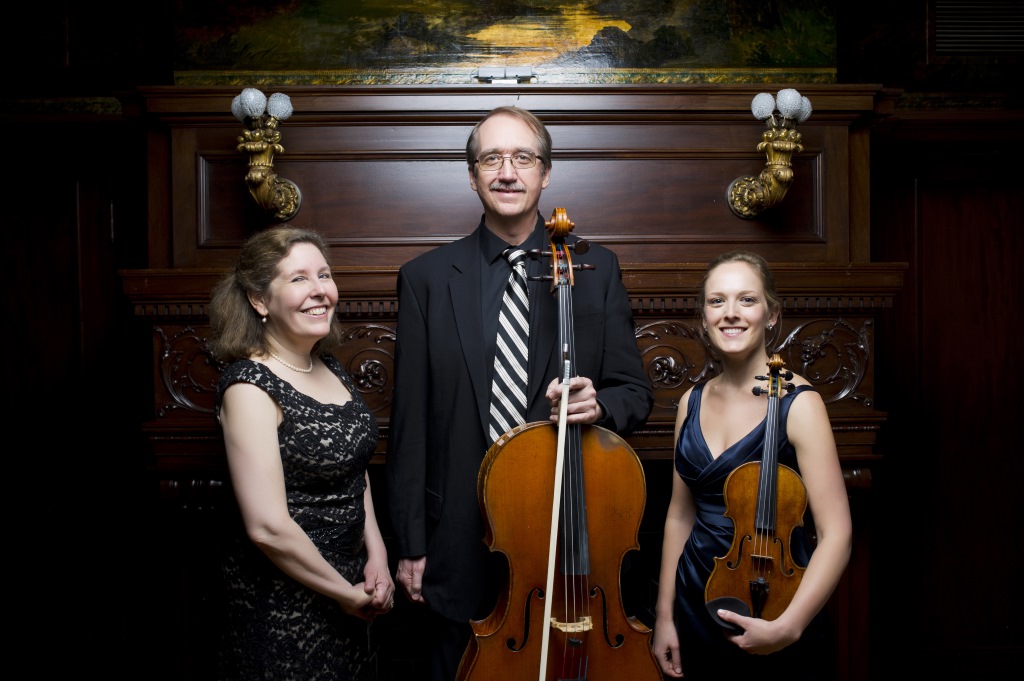The Ghostly Side of Beethoven
Prometheus Trio will play his "Ghost" trio, plus "Three Funny Pieces" that edge toward slapstick.
Next Monday and Tuesday evening, the Prometheus Trio (pianist Stefanie Jacob, violinist Margot Schwartz and cellist Scott Tisdel) will feature two contrasting masterpieces for piano trio.
Ludwig van Beethoven wrote his Trio in D Major, Op. 70, No. 1 “Ghost” (1808) in one of his most productive periods. The opening movement demonstrates the powerful driving force only Beethoven could create for a trio. Beethoven was able to write on a symphonic scale, even for three instruments.
The “Ghost” reference is obvious in the second movement. Opening ominously, the mood evokes mystery and magic. Beethoven was said to have sketched music for a possible opera based upon Macbeth. His recycling those notes for this trio is all we have of that effort. Critic Ryan Turner outlines Beethoven’s vision of Shakespeare’s three witches: “The Largo assai is introduced with an eerie, sustained three notes in the strings, followed by a melancholy response from the piano. After cautiously wandering through multiple tonal centers, unexpected pauses, sudden stops and outbursts, the haunting use of tremolando concludes the movement.”
The ghostly moment stands alone. The energy and joyful character of first and last movements offer a contrasting frame more typical of Beethoven’s chamber works.
About 100 years later, Maurice Ravel wrote Trio in A Minor (1914). After the power and drive of Beethoven, Ravel offers a lighter, exotically beautiful trio which seems simpler because it seems to make do with less. But Ravel’s work is actually quite intricate. A first and fourth movement incorporate compound rhythmic structures from Basque country – Ravel’s homeland. A second movement scherzo incorporates a complex poetic structure borrowed from a form of Malayan poetry. A third movement passacaglia – traditionally a repeated pattern in the bass – moves up the scale and through the instruments, introducing small variations as it repeats. Jacob describes the process: “With each handing-off there is a consequent unfolding in volume and color as the previous instrument goes on to something else; at the movement’s close, the departure of each line marks a gradual fading to nothingness.”
Regardless of the music’s complexity, expect beautiful legato from Schwartz’s violin and a well balanced conversation among the trio.
Also on the program: a work by Edvard Grieg. He began work on a piano trio in 1878, but only completed one movement. His Andante con moto in C Minor (1878) was likely set to be a contemplative middle movement, but the work seems very complete on its own.
Finally, the Prometheus Trio will perform Rodion Shchedrin‘s Three Funny Pieces (1981/1997), which offers a break from the serious stuff. Shchedrin began with fragments of earlier works, then created compositions that strive for unusual and comic sounds from the instruments, unpredictable directions (and misdirection) and occasional slapstick. (Literally. Violin and cello slap their bows against their music stands at one point.)
But Jacob says the trio will aim for mirth in moderation: “We watched a performance of the piece that bordered on slapstick, with the audience laughing (quite loudly) throughout the performance; we preferred the more straight-faced performance by another group that elicited chuckles only at the end!”
The Prometheus Trio will perform on two nights – Monday, December 7th and Tuesday, December 8th at 7:30 at the Wisconsin Conservatory of Music on 1584 N Prospect Avenue. For ticket information see the WCM website or call (414) 276-5760. Additional evening parking is available at Milwaukee Eye Care, 1684 N Prospect Avenue (at Brady St).
Preview
-
PianoArts Festival Features Rising Stars
 May 28th, 2024 by Michael Barndt
May 28th, 2024 by Michael Barndt
-
Four Nations Ensemble Goes For Baroque
 May 13th, 2024 by Michael Barndt
May 13th, 2024 by Michael Barndt
-
Mozart on Prospect Avenue
 May 9th, 2024 by Martha Brown
May 9th, 2024 by Martha Brown




















